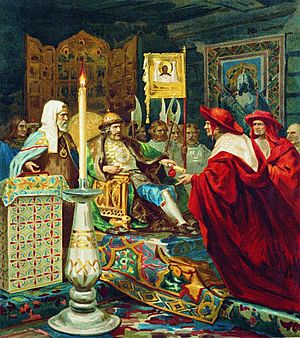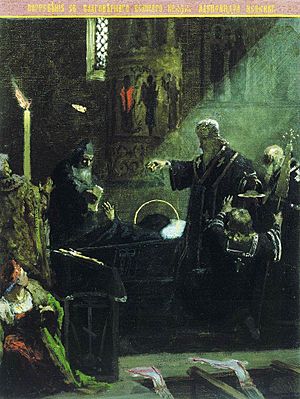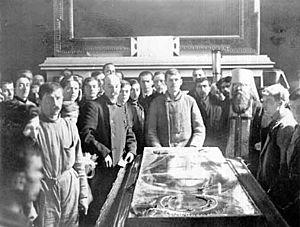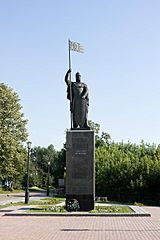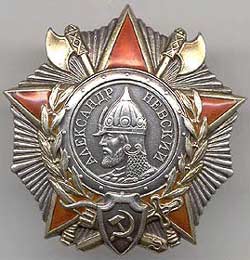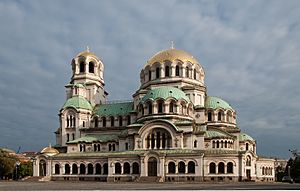Alexander Nevsky facts for kids
Quick facts for kids Alexander NevskyАлександр Невский |
|
|---|---|
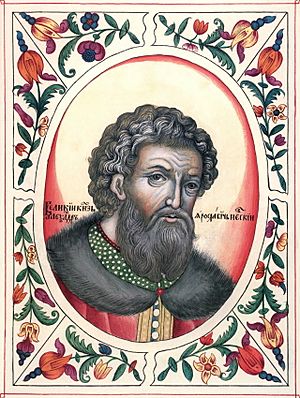
Alexander Nevsky depicted in the Tsarskiy titulyarnik ("Tsar's Book of Titles", 1672)
|
|
| Prince of Novgorod | |
| Reign | 1236–1240 |
| Predecessor | Yaroslav V |
| Successor | Andrey I |
| Reign | 1241–1256 (second time) |
| Predecessor | Andrey I |
| Successor | Vasily I |
| Reign | 1258–1259 (third time) |
| Predecessor | Vasily I |
| Successor | Dmitry I |
| Grand Prince of Kiev | |
| Reign | 1246–1263 |
| Predecessor | Yaroslav III |
| Successor | Yaroslav IV |
| Grand Prince of Vladimir | |
| Reign | 1252–14 November 1263 |
| Predecessor | Andrey II |
| Successor | Yaroslav III |
| Born | 13 May 1221 Pereslavl-Zalessky, Vladimir-Suzdal |
| Died | 14 November 1263 (aged 42) Gorodets, Vladimir-Suzdal |
| Burial | Alexander Nevsky Lavra, Saint Petersburg, Russia |
| Spouse | Paraskeviya (Alexandra) of Polotsk Vasilisa (Vassa) |
| Issue | Vasily Alexandrovich Eudoxia Alexandrovna Dmitry Alexandrovich Andrey Alexandrovich Daniil Alexandrovich |
| House | Rurikid |
| Father | Yaroslav II of Vladimir |
| Mother | Feodosia Igorevna of Ryazan |
| Religion | Eastern Orthodoxy |
Alexander Yaroslavich Nevsky (Russian: Александр Ярославич Невский; 13 May 1221 – 14 November 1263) was an important leader in Kievan Rus' (an early East Slavic state). He served as Prince of Novgorod, Grand Prince of Kiev, and Grand Prince of Vladimir. These were very challenging times for his country.
Alexander is known as a legendary figure from the Middle Ages. He became famous for his military victories against invaders from Sweden and Germany. He helped keep his country independent and protected the Orthodox Christian faith. To do this, he agreed to pay tribute to the powerful Golden Horde. In 1547, the Russian Orthodox Church declared Alexander Nevsky a saint.
Contents
Early Life
Alexander was born in Pereslavl-Zalessky. He was the second son of Prince Yaroslav Vsevolodovich and Feodosia Igorevna. His father was a powerful ruler.
Reign as Prince and Grand Prince
Prince of Novgorod
In 1236, the people of Novgorod chose Alexander to be their prince. His job was to lead their army and protect their lands. These lands were in the northwest and faced threats from Swedish and German invaders.
Battle of the Neva
In 1240, the Swedish army landed near the Neva River. Alexander, who was only 19 years old, quickly attacked them with his smaller army. He defeated the Swedes on July 15, 1240. This victory, known as the Battle of the Neva, stopped a major invasion from the West. Because of this battle, Alexander earned the nickname "Nevsky," which means "of the Neva."
This win made Alexander more powerful. However, it also caused problems with the local nobles, called boyars. He soon had to leave Novgorod because of these disagreements.
Battle on the Ice
Later, Catholic German and Estonian crusaders invaded Pskov. The leaders of Novgorod asked Alexander to return. In the spring of 1241, he came back from exile. He gathered an army and drove out the invaders.
Alexander's army faced the Livonian knights on the frozen Lake Peipus. On April 5, 1242, he defeated the German knights and Estonian soldiers. This famous battle is known as the Battle on the Ice.
After these invasions, Alexander continued to strengthen Novgorod. He made a peace treaty with Norway in 1251. In 1256, he led his army to Finland and defeated the Swedes again. They had tried to block Novgorod's access to the Baltic Sea.
Grand Prince of Vladimir
In 1238, the Mongols conquered the Principality of Vladimir. Its ruler was killed. Alexander's father, Yaroslav II, became the new Prince. He then made Alexander the ruler of Novgorod.
In 1245, Alexander's father died while visiting the Mongol capital. In 1248, Alexander and his older brother, Andrey II, also traveled to the Mongol capital. Andrey became the Grand Prince of Vladimir, while Alexander was given the title of Prince of Kiev.
Alliance with the Golden Horde
When Möngke Khan became the new Great Khan in 1251, all Russian princes had to visit the Mongol capital, Sarai. Andrey refused to go. Alexander, who was friends with Sartaq Khan (a Mongol leader), became the Grand Prince of Vladimir in 1252. This meant he was the supreme ruler of Russia.
Alexander supported Mongol rule in his lands. In 1259, he led an army to Novgorod. He forced the city to pay tribute to the Golden Horde, which they had refused to do earlier.
Some historians believe Alexander's decision to work with the Golden Horde was very important. It helped keep the East Slavs' Orthodox Christian faith strong.
Death and Burial
On November 14, 1263, Alexander died in the town of Gorodets. He was returning from one of his many visits to the Golden Horde. He was buried on November 23, 1263, in a monastery church in Vladimir.
Veneration and Sainthood
| Saint Alexander Nevsky Александр Невский |
|
|---|---|
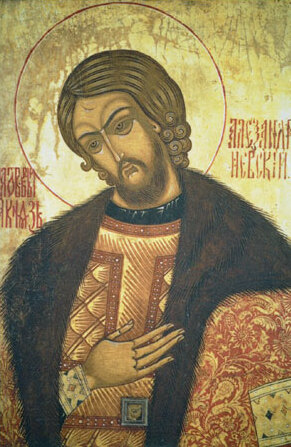 |
|
| Grand Prince of Vladimir | |
| Venerated in | Eastern Orthodox Church |
| Canonized | 1547 by Metropolite Macarius |
| Major shrine | Vladimir; Pereslavl-Zalessky, Saint Petersburg |
| Feast | 23 November (Repose) 2 May (Synaxis of the Saints of Rosand Yaroslavl 30 August (Translation of relics) |
| Patronage | Russian Ground Forces and Russian Naval Infantry |
People began to honor Alexander almost immediately after his death. It is said that he extended his hand for a prayer during his burial. According to Orthodox tradition, Alexander knew he would die soon. Before his death, he took strict Orthodox Christian monastic vows. He took the new name Alexey.
In 1380, Alexander's remains were found to be incorrupt (not decayed). This happened before the Battle of Kulikovo. His remains were then placed in a special shrine. In 1547, Metropolitan Macarius declared Alexander a saint of the Russian Orthodox Church.
In 1695, a new wooden reliquary (a container for relics) was made in Moscow. The relics were placed inside it in 1697. In 1723, Peter the Great ordered the relics to be moved from Vladimir to Shlisselburg. They were later brought to Saint Petersburg in 1724. They were placed in the Annunciation Church of the Alexander Nevsky Lavra.
In 1753, Empress Elizabeth of Russia donated a large silver shrine for the relics. It was made with 90 pounds of silver. In 1790, the shrine and relics were moved to the Holy Trinity Cathedral of the Alexander Nevsky Lavra.
In May 1922, during a time when the Russian Orthodox Church's property was taken by the government, the shrine was opened. The silver shrine was moved to the Hermitage Museum, where it is today. The relics were stored in a museum. In 1989, they were returned to the Holy Trinity Cathedral.
Alexander's main feast day is November 23. Another feast day is on August 30. This day remembers when his relics were placed in the Annunciation Church. He is also remembered with other saints of Rostov and Yaroslavl on May 23.
Family
Alexander married a daughter of Bryacheslav Vasilkovich in 1239. She was the Princess of Polotsk and Vitebsk. Her name is not fully known, but some records call her Paraskeviya or Alexandra. They had five children:
- Vasily Alexandrovich (c. 1239–1271). He was a Prince of Novgorod.
- Eudoxia Alexandrovna. She married Konstantin Rostislavich, Prince of Smolensk.
- Dmitry of Pereslavl (c. 1250–1294).
- Andrey of Gorodets (c. 1255 – 1304).
- Daniel of Moscow (1261 – 1303).
Alexander married a second wife named Vasilisa or Vassa shortly before he died. They had one son, Daniel.
Legacy
Alexander's grandson-in-law, Daumantas of Pskov, continued some of his policies. Daumantas was also later made a saint. In the late 1200s, a story called the Life of Alexander Nevsky was written. It showed him as a perfect prince and soldier who defended Russia.
On May 21, 1725, Empress Catherine I created the Imperial Order of St. Alexander Nevsky. This was one of the highest honors in Russia. During World War II, on July 29, 1942, the Soviet government created the Order of Alexander Nevsky. This was to honor Alexander's fight against the Germans.
In 1938, Sergei Eisenstein made a famous film called Alexander Nevsky. It was about Alexander's victory over the Teutonic Knights. The music for the film was written by Sergei Prokofiev. The film is famous for its amazing battle on ice scene. This scene has inspired many other movies. The film also included a famous saying, "Whoever will come to us with a sword, from a sword will perish." This line is often thought to be from Alexander Nevsky, but it actually came from Eisenstein's film.
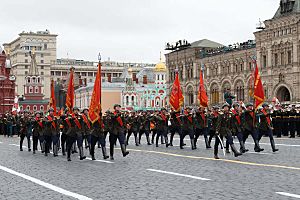
Many Russian naval ships have been named after Alexander Nevsky. These include a 19th-century frigate and a modern nuclear submarine, the K-550 Alexander Nevsky.
Alexander Nevsky's fame has spread beyond Russia. Many cathedrals and churches are named after him. These include the Patriarchal Cathedral in Sofia, Bulgaria, and cathedrals in Tallinn, Estonia, Łódź, Poland, and Ungheni, Moldova.
On September 24, 2008, Alexander Nevsky was voted the main hero of Russia's history. In December 2008, he was voted the greatest Russian in a TV poll called Name of Russia.
During the 2021 Moscow Victory Day Parade, soldiers wore historical uniforms. They carried Soviet combat banners that had received the Order of Alexander Nevsky during World War II. This was to mark 800 years since Alexander Nevsky's birth in 1221.
See also
 In Spanish: Alejandro Nevski para niños
In Spanish: Alejandro Nevski para niños
- Life of Alexander Nevsky (illuminated manuscript)
- Alexander Nevsky Cathedral—a list of churches named after him
- Rulers of Russia family tree


